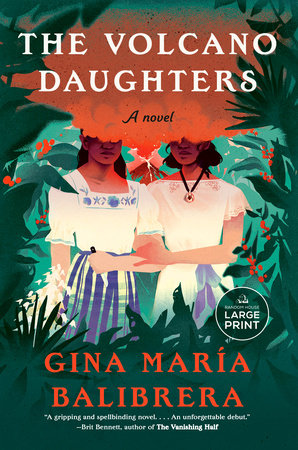1
Our mothers carried us on their backs until we kicked in the noontime heat. In the afternoons, they untied us, babies all born in the same season, and let us crawl beneath the ceiba tree as they worked. In those early days, before we could walk, before María was born, las faldas of the ceiba were high and wide enough to contain us. We ate earthworms and licked the ceiba’s bark. We waved at the birds and sprouted teeth while our mothers took turns running over from the coffee fields to count that we were all still there, quickly pointing at each of us as they did. Lourdes, Cora, Lucía, Graciela. They took turns making sure that none of us were choking or hungry or covered in shit. They took turns nursing us, two at once to save time. They took turns, patting all of our little bellies, rubbing our backs, wiping caca from our fat little butts with a rag, rocking us to sleep and setting us down again between the skirts of the roots. We were safe.
During the rainy months, in the late afternoons, our mothers piled us together like sacks of yucca inside the sorting room. We napped as rain soaked the roof, awakened the smell of the building’s history—the sharp stink of last year’s cherry harvest, the bitterness of indigo. In that room we crawled over one another’s baby legs and patted one another’s cheeks, not knowing where one of us began and another ended. In that room, we took our first tumbling steps. María was born in the rainy season, and then we were five: Lourdes, María, Cora, Lucía, and Graciela.
Later, when we were older, we went to the nuns, who dressed us, who taught us to read and write, who cared for us during the day while our mothers worked. The nuns dressed us from bins that arrived from abroad. We had our own clothes, refajos that our grandmothers had made, long woven skirts, tops with the smallest embroidered starflowers lining an open collar, but these became nightgowns in favor of the pastel dresses from the nuns, ruffled dresses that rapidly grew too short for our growing legs, too tight around our bellies, dresses with puffed sleeves made of tulle, lace, and starched cotton. On our feet we wore soft leather sandals like our mothers—we called them caites—but María always kicked hers off, said she ran so fast they burned her heels.
Somewhere on the volcano there were men, driving carts, working beside our mothers, guiding animals uphill, but we rarely spoke with them, nor did we sense or mourn their absence from our daily lives. We took turns imagining our fathers because we thought an understanding of who they were might unravel the mystery of who we were. It didn’t. We were of our mothers.
Our mothers talked to us about the fathers of our friends, but never about our own. But from their chambre, we pieced together some stories. Graciela’s father was much older and had once lived here. His name was Germán and he was a colono—he’d risen in the ranks at the finca until he’d owned his own plot of land. At the time he had chosen Socorrito, Graciela’s mother, Germán was the most powerful man on the finca after the old patrón. He pursued her, leaving her gifts that were entirely impractical for the life that she lived, but told a story about who he was becoming, and the kind of life that he might offer her—silk stockings, a perfume oil that smelled of lavender, a velvet hat with a little net, a purse made of glittering beads.
As a boy, he’d met a gringo railroad man who drank special water—water in all sorts of colors—that he said made him more powerful, allowed him to listen to the dead and control the future. This crazy gringo was rich and promised Germán he’d purify his soul with that special water, with his potions of color and light. He swore that he could raise Germán out of the circumstances he was living in, out of the colonato, the system that bound him to labor on the coffee finca on the mountain. Germán, fatherless, poor, had listened to the gringo, who promised him a future in the railroad he was building to bring the coffee crop to the coast, and sent him abroad to study economics in Switzerland. His coursework and experience in the shadow of the Alps eventually proved irrelevant to his later position as the General’s oracle, but afforded him a refined sense and understanding of the improbable.
The gringo, Brannon was his name, was obsessed with colors—thought some healed, some gave vitality. And when he saw Socorrito, whom he knew Germán liked, he encouraged the match, for, as we understand now, the color of her skin, fairer than any of our mothers’, was exactly what he was after.
Transmission. Stories all have masters who control how they’re told and to whom. Thanks to the rich gringo, Germán had become a master. And as a teenager, he transmitted the gringo’s stories to his best friend, a man we came to know as el generalísimo, El Gran Pendejo. They were boys together, you see. El Gran Pendejo was from the volcanoes too, though later he did everything he could to erase that history, believed this bullshit from the gringo could help him do it, could help him erase any trace of where he came from, to separate our stories from his own.
By the time that Socorrito’s first pregnancy, with Graciela’s older sister, Consuelo, had begun to show, Germán had already left the finca to live in the capital. The General was rising in the ranks there and found Germán a post as his spiritual adviser. Soon, Germán married in the capital as well. Socorrito hoped that even though Germán had left her, she might still have rights to his land, but while he had been freed from el colonato, she was fixed in place.
Then, when Consuelo was four, a man, a thug from the capital, came to our village and took Consuelo from her mother’s arms, after knocking Socorrito unconscious.
He left a note on the ground, which Socorrito discovered when she awoke, and considered destroying its fine seal, its delicate paper, its blot of indigo ink, in the fury of her rage and grief. Instead, reasoning that this was perhaps the only way she might find her daughter, she brought the paper directly to the gringa nuns to decipher for her, moving through her thick pain like a sleepwalker, because Socorrito could not read the lavish penstrokes of her child’s father.
Germán had Consuelo and he intended to keep her in the capital. You see, this new wife of Germán’s was barren and Consuelo was to be a gift for this barren woman, who yearned to be a mother. She would be una consolación; she would live up to her name.
In the capital, Consuelo would receive an education. She would live there not as a servant, but as a daughter. She would not be made to work; she’d already been removed from el colonato, which we’d all been born into, which our mothers and grandmothers had been born into. El colonato, which tethered us to the finca, where we would work until we died. Instead, Consuelo would become “civilized”—that was the word Germán used in the letter. And when she was an adult, she could choose to leave the capital and return to the volcano, if she so wanted.
This was all written on the piece of paper that Socorrito had received. Sister Iris had slowed over the word “civilized” as she read.
After that Socorrito slept with the paper—the promise, she called it—under her head. This small scrap may have been the only thing tethering her to the earth, now that her daughter was gone.
Our mothers comforted her with laughter, when it became clear that their anger and sorrow would not return Socorrito’s daughter to her.
Civilized, they scoffed. “With that pelo colocho, nearly as colocho as mine?” Rosario made this same joke every time, gesturing at her own curly hair. Colocho, pero colocho. Rosario was Black, tiny, and striking, with golden-brown eyes. She was delicately vain about her beauty, reminding us of a small lioness. She strutted before the other women when they gathered to bathe in the river on hot days, her short feet wide and soft as paws, gems of water dripping from her hair as she stretched her arms in the sun. We, her daughters María and Lourdes, our skin went lighter on a gradient—Lourdes’s a deep, warm brown, and then María de piel canela.
We imagined Consuelo more pale still, como una chelita, but with pelo colocho that some indita in the capital was forced to press flat every day with an iron, or else shove under a hat. She’d be like the characters in those books that the nuns had given us, about orphans in ruffly pinafores in old-timey England—a girl who would never want to return to the volcano.
Even after Consuelo was taken, Germán returned to the volcanoes now and then, but Socorrito was never again invited to stay on his land. Still, he found time to impregnate her, this time with Graciela, and this time without love, without tenderness, without gifts. Socorrito had hoped that by offering herself to him again, she could convince him to bring Consuelo home and stay. But at the end of each visit he returned to the capital and left her behind.
Over and over, throughout our childhoods, our mothers let slip that Graciela’s father was not only still alive, but living in the capital, as the General’s second-in-command. According to our mothers, Germán was his most trusted adviser. The General made no decisions without consulting him first. But on the radio, the General, baboso that he was, announced that he alone was the one who ruled the tides, who told Izalco when to erupt, who shaped the moon. He talked about the coffee harvest as if he’d picked every last cherry himself, as if he’d invented the railroad that carried the beans to port and out of the country, where they were transformed into fantastic amounts of money that we never saw. He spoke of the great ships at port from Los Yunais as his Very Good Friends. (“My Very Good Friend Los Estados Unidos enters the harbor of La Libertad on this blessed day!”) We thought he was a clown. He really believed these things—that he had the power to control our whole universe; it was the same tontería that the gringo Brannon had talked about, that if he surrounded himself with red curtains and bathed in turquoise water, he’d be invincible. He may have heard the stories secondhand from Germán, but the General had swallowed more of this gringo’s crazy water than his friend. When he came on the radio to announce a new victory—how he manipulated the weather, how he could perceive the world’s radiant vibrations by pissing and shitting, which he deemed sensory activities, like seeing and hearing, how he used that wisdom to shape the price of an automobile—our laughter smothered his rejoicing.
Men. They made us laugh then.
Cora’s father, meanwhile, was a mystery to us for many years; we thought maybe he was a stranger we sometimes saw driving a cart through town. But then María heard her mother, Rosario, talking about el patrón as though it were him. We howled at that idea. Corita was too sweet, too smart, to have that bolo for a father.
Lucía’s father, light as she was, must have been visiting on business from Los Estados, but we never heard much about him.
And unlike the rest of us, Lourdes and María had been claimed, in a slight way at least, by their father. He was a rich and ordinary man whose parents owned the finca and the land that we worked on, a coffee man who lived in the north, in some place called California, with a chele wife and twin daughters a couple of years younger than us. He came to the village twice a year, in October and April, before the harvest and after. With his shoes sinking into the mud. With his long black car’s nose pointed always away from the volcano. Las hermanas had been told never to call him Papá—always El Señor Domínguez—but when they were alone, they couldn’t help themselves.
The closest we came to him was María’s christening. He brought blankets and a stuffed rabbit for María and a porcelain doll with blue glass eyes that opened and shut for Lourdes, and he stood in the back of the church while the visiting priest anointed María’s little head before dipping it into the fount. After the ceremony, while everyone slowly filed out of the church, he slipped out too, and drove back to the capital without saying goodbye. Their mami said, “He paid for everything, the lace dress, the tiny shoes. I’m not going to make him pretend.” After that he grew distant again; even when he was in the village, his eyes looked through us. He and his brother owned the point that our world turned on, but he didn’t change the shape of our lives. We were distant moons to him.
In those years, though, we were safe. Our mothers protected us. What had happened to Consuelo was a distant past before our births, and since then, our mothers had encircled us with joyful ferocity. What had happened to Consuelo could never happen again.
Copyright © 2024 by Gina María Balibrera. All rights reserved. No part of this excerpt may be reproduced or reprinted without permission in writing from the publisher.













